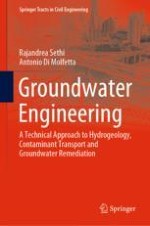2019 | OriginalPaper | Buchkapitel
10. Mechanisms of Contaminant Transport in Aquifers
verfasst von : Rajandrea Sethi, Antonio Di Molfetta
Erschienen in: Groundwater Engineering
Aktivieren Sie unsere intelligente Suche, um passende Fachinhalte oder Patente zu finden.
Wählen Sie Textabschnitte aus um mit Künstlicher Intelligenz passenden Patente zu finden. powered by
Markieren Sie Textabschnitte, um KI-gestützt weitere passende Inhalte zu finden. powered by
